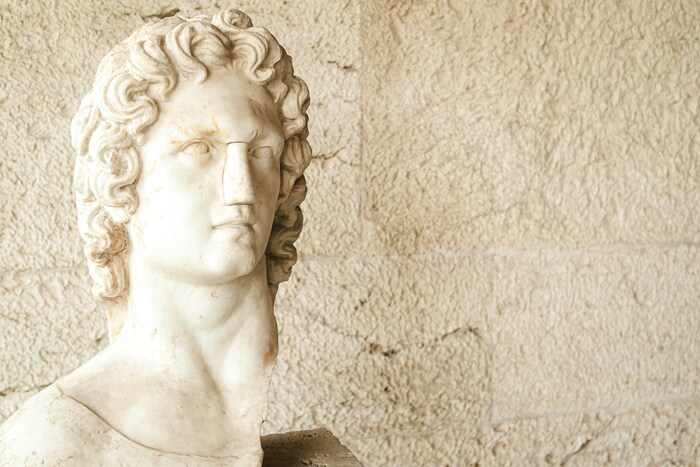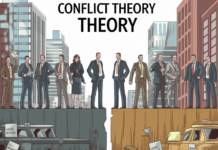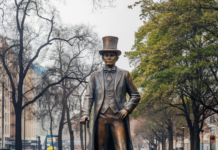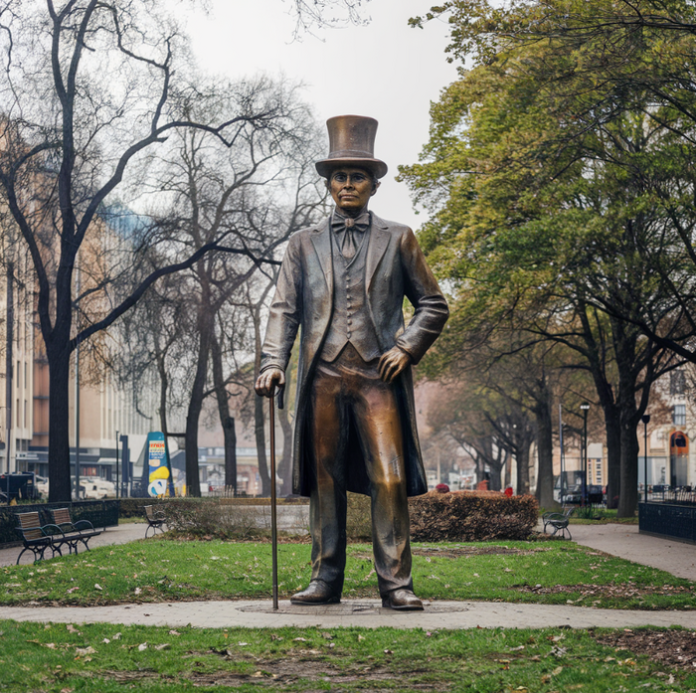At the age of 20, Alexander the Great rose to power as the King of Macedonia. During the next 13 years of his reign, Alexander the Great created one of the largest empires of the ancient world and people today know him as one of history’s greatest military generals. It would seem that Alexander’s young age did not limit his success as a ruler. One might even say he was a born leader. Herein lies the idea of the Great Man Theory: leaders are born with the qualities that make them great. Certain individuals possess inherent leadership traits rather than acquiring them through teaching. This theory proposes an explanation for the success of great men, suggesting that leadership is a predetermined fate for them.
What is the Great Man Theory?
The 19th-century Scottish philosopher Thomas Carlyle coined the Great Man Theory. He believed, “The history of the world is but the biography of great men.” He thought Great Men were born for greatness. Their presence united many of history’s key events. The theory stems from the leadership ideas of Plato and Aristotle. They believed that “the best” among the people should be the rulers. Plato proposed the philosopher-king. The ideal ruler has a philosophical nature. For Aristotle, the ruler should be a man of virtue and one who rules in the interest of their people.
Further, these rulers possess wisdom, integrity, temperance, courage, and justice. Under the Great Man Theory, these characteristics are innate, possessed by certain people upon birth, and make them destined for leadership. This suggests that the genetic makeup of Great Men is different from that of a normal person, and they can pass on their greatness through their bloodline. This idea sparks the nature vs. nurture debate, suggesting that nature influences leadership more than nurture can cultivate it. This may explain the likes of Alexander the Great, for whom leadership was an inherent quality even at a young age.

Historical Context
The notion of the Great Man theory came to its primary proponent, Thomas Carlyle when he experienced the Industrial Revolution and resonated with the vision of a “non-materialist historical progress and social evolution.” He saw the leaders as Great Men who should serve as models and idols because he believed they were the masterminds behind the great advancements of the time. In his work On Heroes, Hero Worship, & the Heroic in History (1841) based on a series of lectures, Carlyle introduced six types of heroes and corresponding exemplary figures of the time.
● The Hero as Divinity (Odin and Scandinavian paganism)
● The Hero as Prophet (‘Mahomet’ and Islam)
● The Hero as Poet (Dante and Shakespeare)
● The Hero as Priest (Luther and Knox)
● The Hero as Man of Letters (Johnson, Rousseau, and Burns)
● The Hero as King (Cromwell and Napoleon)
Carlyle emphasized the significant contributions of these figures in their specific domains, including literature, religion, and politics. He believed that they could create significant impacts in history because of their unique intrinsic gifts and characteristics, and that people should exemplify and idolize these heroes.
The Great Man Theory was further supported in a statistical capacity by English explorer and anthropologist Francis Galton. Credited with the concept of eugenics, he also pioneered studies of human intelligence. In his work Hereditary Genius (1869), Galton proposed that an individual’s mental and natural abilities are hereditary, as physical abilities are. He showed that “genius” runs in families, as evidenced by the significant number of Great Men in England, including military leaders, scholars, and artists, originating from families belonging to the small upper-class stratum. Hence, Galton believed that the solution to achieve a superior race was developing a system of arranged marriages between these families, coupling distinguished men with affluent women. Although Galton’s views remain controversial because of the nature of eugenics, his work initiated the scientific analysis of the Great Man Theory.
Key Characteristics of Great Men
What, then, do these traits ingrained in the Great Man entail? These are characteristics that one would value in a leader that make them an effective ruler over their people.

Intelligence
A leader bears the burden of making complex decisions that often lead to unintended consequences and are rarely clear-cut. They should be able to navigate these problems to create the best solutions for everyone affected. As Plato suggested, the philosophical nature of a leader is vital in determining the condition of a state. Many disciplines involve leadership processes, hence making excellent mental capacity and ability desirable in a leader.
Yet, researchers have not determined whether intelligence is hereditary. Deary, Cox, and Hill examined over 10 years of genetic research on intelligence in a 2021 article and found that brain imaging and genetic associations influence intelligence variation to some extent. However, they cautioned that this finding is inconclusive because there is still much more research needed in the field to provide a complete explanation of the differences in intelligence among people.
Courage
Organization and decision-making for a large group of people is no easy feat and not one for the faint of heart. Leaders face a multitude of challenges that are significantly heavier loads to carry than that of an average individual, especially due to the much more serious consequences of making the wrong decision. Further, courage is a balance of multiple important values. A courageous leader is not only outwardly strong and brave but should also be transparent and humble, which shows a different kind of courage in facing constituents who rely on one’s leadership. While courage is not merely aggressiveness, a leader should not be afraid to make tough decisions, if the situation calls for it.
Charisma
One cannot be a leader if there are no followers, hence it is important to have the ability to cultivate relationships and inspire faith. Communication with the people is important because it offers valuable insights into the direction of leadership and what changes are necessary. A communicative leader gains the trust of the people, which makes it easier to enlist their cooperation in matters of the state. They can persuade, motivate, and empathize. They can move people to action to enact the changes that they wish to achieve. Charismatic leaders can also inspire in moments of difficulty, serving as a beacon of hope to let the people know that their leader is someone reliable and will guide them through. A leader who has the complete acceptance of their people is a sign of successful leadership.
Confidence
No one follows a leader that is unsure of themselves. Displaying confidence, especially in the face of adversity, is an admirable trait for a leader. It inspires trust in the people and assures them that they are in good hands. Knowing that their leaders know what they are doing lets them feel at ease and makes them more willing to do what is asked of them, believing that it is what is necessary under the circumstances. A leader with confidence in their self and their beliefs has a clear goal in mind and will know the direction that they wish to take, making them less susceptible to negative influences and allowing them to firmly stand with their principles against attempts to mislead them.
Determination
A goal-oriented leader with a clear platform and a passion for the welfare of the people knows with certainty what they want to achieve and will do what they can to get there. Determination, along with the previous traits discussed, will help achieve any intention. It helps to prevent from being sidetracked by temptations and unjust practices. It equips a leader with the ability to focus and move past the barriers to success.
These traits were believed to be inherent in born leaders, and cannot be developed in anyone else without that destiny. In analyzing the achievements of history’s prominent figures that inspired great changes, these traits can be observed in their actions, and have appeared to have guided their successes.
Great Men in History
Here, we introduce great names that have echoed through generations, attributed to their momentous contributions to history.
Julius Caesar
Julius Caesar was a Roman general and dictator whose political reign made a significant impact on Greco-Roman history, recognized today, even though his time in power was brief. As a dictator, he used his power to enact government reforms, strengthen the Senate, decrease Rome’s debt, and rebuild Carthage and Corinth. People described Caesar as a genius because of his intellectual and physical abilities, which led to triumphs in warfare and politics and earned him the respect and devotion of his soldiers. He was also reported to exhibit his humanity and spirituality through generosity towards defeated opponents. Although Caesar lacked charm, he possessed formidable strength and could have accomplished great things if not for his assassination.
Napoleon Bonaparte
Napoleon Bonaparte was a French general, first consul, and emperor. He earned recognition for his military leadership and for revolutionizing military organization and training, and history still considers him one of the greatest military generals. During his tenure as first consul, he established reforms in the French educational system; developed the Napoleonic Code, a civil code that declared all men equal, eliminated class privileges, released civilian institutions from sectarian control, and promoted principles for freedom and private property; and negotiated the Concordat of 1801, which established the status of the Roman Catholic Church in France. His military acumen saw him through many wars, though not all were successes, but he always remained true to his vision of military expansion for France.
Abraham Lincoln
Abraham Lincoln was the 16th President of the United States. He was a self-made man with humble beginnings, who rose through the ranks and remained dedicated to his country. Among his greatest legacy is the freedom of slaves within the Confederacy through the Emancipation Proclamation. He advocated for peace and strived to end the Civil War, promoting unity and charity throughout the nation. His eloquence and charisma empowered him to execute his authority, and he is remembered for his intelligence and unwavering ideals for liberty and human rights.
These historic names and their particular brands of leadership allowed for significant changes made to each of their respective nations, with each great man leaving their permanent mark in history. We can summarize the similarities between these leaders by examining the traits discussed in the previous section. Their intelligence, courage, charisma, confidence, and determination in the fields of military and politics enabled them to establish a solid foundation, chart a course, and achieve success in the end. However, whether these traits are truly in their blood remains to be seen.
Criticisms of the Great Man Theory
Since its emergence, critics have raised objections to the Great Man Theory. One of the major issues is the lack of empirical support and scientific evidence. Galton’s Hereditary Genius served as a statistical analysis and fails to support the claim of genetic inheritance. Molecular genetics and studies of inheritance is a relatively new field and there is still a lot of room left for improvement. While it is now possible to investigate the inheritance of physical traits, there is yet to be a protocol to study the heredity of multiple intangible traits that make a good leader.
The Great Man Theory also envisions an oversimplified view of leadership. It suggests that the leader, standing alone, can do great things. It ignores other factors that support leadership, such as organizational hierarchy and previously established laws. Additionally, it does not consider the roles of followers. With the focus on one person as a leader, there is an assumption that the followers will do whatever is asked of them. Sociologist Herbert Spencer, in his work The Study of Sociology, emphasized that “Before he can remake his society, his society must make him.” This critique against the Great Man Theory highlights the role of society in creating a leader, such that a “Great Man” without the support and action of society, is just another normal citizen.
Leo Tolstoy is another critic of the theory, suggesting that the “greatness” of Great Men is born from their illusions, created by their “conceitedness and arrogance.” Further, he explains that these narratives persist because of biases built into these narratives. After all, history is often written by the victors. This criticism by Tolstoy shifts the perspective of the theory from the perspective of the follower, as was Carlyle who idolized the Great Men, to the Great Men themselves. Tolstoy perpetuates the belief that men should not be made into heroes.
Through these criticisms and multiple other studies over the years since the theory was first proposed, there have been several other perspectives of leadership that have become more adapted to modern leadership.
Behavioral Theories
Contrary to the Great Man Theory, behavioral theories focus on learned behaviors as opposed to innate traits. It proposes that anyone can be a leader because they can learn and develop the characteristics of an effective leader. There is an emphasis on behavior, how a person acts on the path to leadership, and how they proceed once in a position of power. This theory resonates with a popular quote by NFL coach Vince Lombardi, “Leaders aren’t born, they are made. And they are made just like anything else, through hard work. And that’s the price we’ll have to pay to achieve that goal or any goal.”
Situational Theories
One of the criticisms against the Great Man Theory is the assumption that a Great Man will lead well in any situation. Under the situational theory, however, the effectiveness of a leader depends on situational factors. A good leader should be able to adapt to situational changes. This theory proposes that there is no single leadership style that applies to all situations, hence the ideal leader should be flexible enough to change as the situation demands.
Transformational Leadership
This theory is among the modern views of leadership. The ever-changing world has allowed for the emergence of revolutionaries who are not particularly in positions of government power, such as Steve Jobs and Bill Gates. These names are familiar as much as the prominent historical figures because they were able to enact revolutionary changes that improved the way of life. Transformational leaders are capable of guiding and motivating their followers to reach their individual goals as well as the goals of the collective. The leader leads by example and works closely with the team to ensure the success of everyone involved. This style of leadership is often employed when there is a need for revitalization, significant changes, or a new direction for the group.
The Great Man Theory in the Modern World
The Great Man Theory is among the early studies on leadership theories, and despite the criticisms of its validity, it remains influential in social studies today. Even though there has not been scientific evidence to back its claim, it is worth noting that there has not been a scientific-based rebuttal against it, either. The similar traits of well-known and loved leaders remain proof that there is a common thread among Great Men. It remains an open point for research, especially in genetics fields of study. The relevance of the theory is observable as it is still referenced in discussions about innate vs. learned qualities, which connects to the nature vs. nurture debate. This emphasizes its significance in both social studies and natural sciences.
The theory also offers a foundation for understanding historical perspectives on leadership. It was built on patterns observed among great leaders, and it is a pattern that remains to be observed in esteemed leaders of today. We do, after all, learn from history. Comparisons between historically celebrated leaders and those who live in infamy provide insights into what characteristics remain the same and what made their legacies so different. Perhaps what we gain from these studies would be enough to prevent us from repeating the unfortunate events of our past.
Conclusion
The Great Man Theory proposed the idea that some people are born with the inherent traits of intelligence, courage, charisma, confidence, and determination that make them great leaders. These characteristics are hereditary and passed down through familial generations. The Great Man is embodied by born leaders such as Alexander the Great, Julius Caesar, Napoleon Bonaparte, and Abraham Lincoln–all leaders who have made their mark in history.
Thomas Carlyle birthed the idea from experiencing the non-material developments and social evolution that he believed were attributed to the Great Men. Francis Galton further supported the theory with his statistical analysis that showed how the Great Men originated from the smaller upper-class population. Criticisms of the theory include the lack of scientific evidence, its oversimplification of leadership, its exclusion of the role of followers and situational contexts, and Tolstoy’s belief that greatness is the “great man’s” illusion. Modern viewpoints that stray from the Great Man Theory include behavioral, situational, and transformational leadership theories that consider many of the factors addressed by the criticisms.
While there is not a unified consensus on the correct or best theory on leadership, who’s to say which of us are meant to be leaders? Here I quote William Shakespeare, “Some are born great, some achieve greatness, and some have greatness thrust upon them.”
Much remains to be considered in the complex and multifaceted concept of leadership. There may be differing views on what makes a good leader, and not everyone may agree on one, mostly because the modern world has become so much more complex, and situations vary from each corner of the globe. Many more leadership theories have been proposed, and any one of those might resonate with you and your position. What remains important throughout all these talks of leadership is that you, as a citizen, make your voice heard.
















